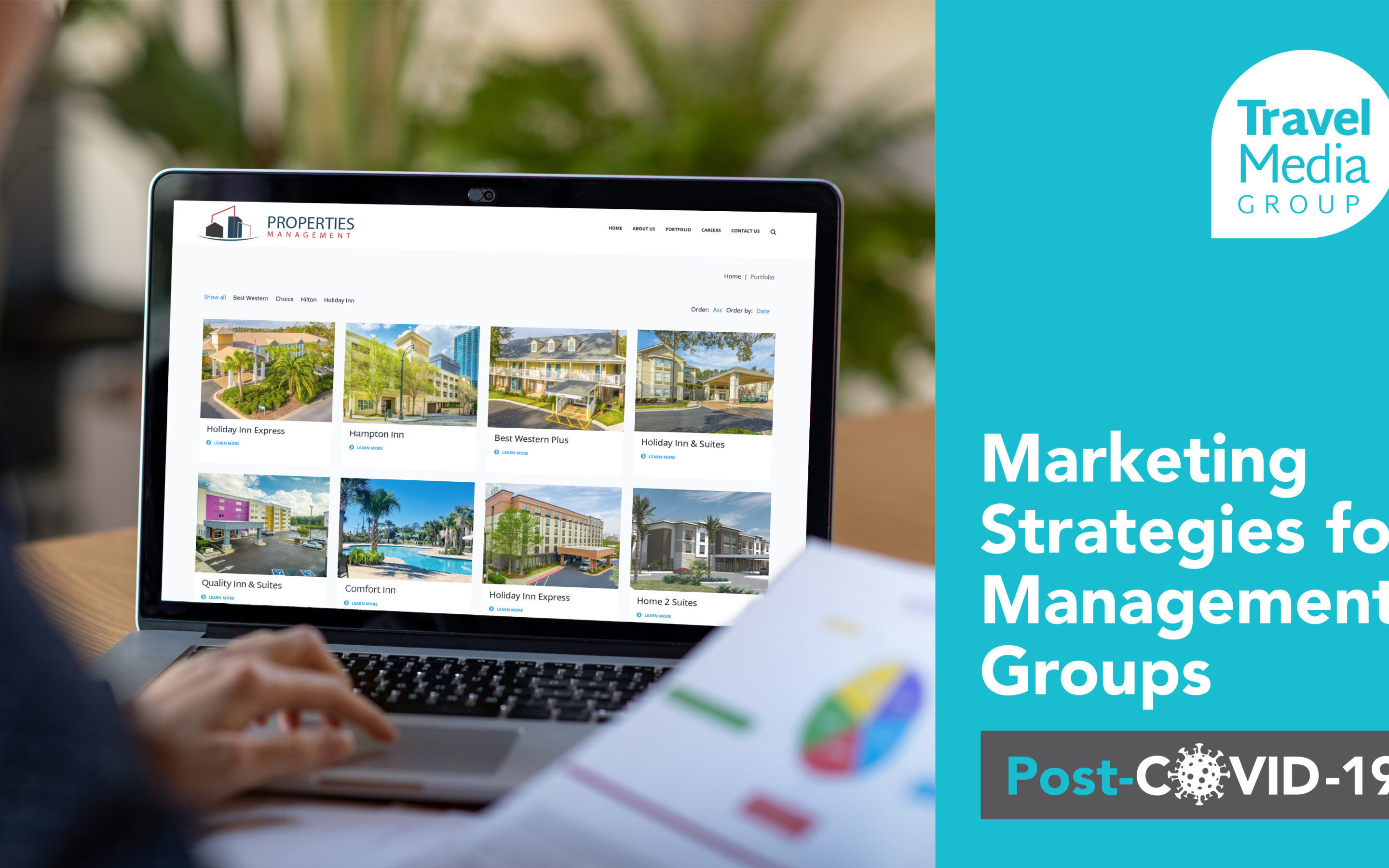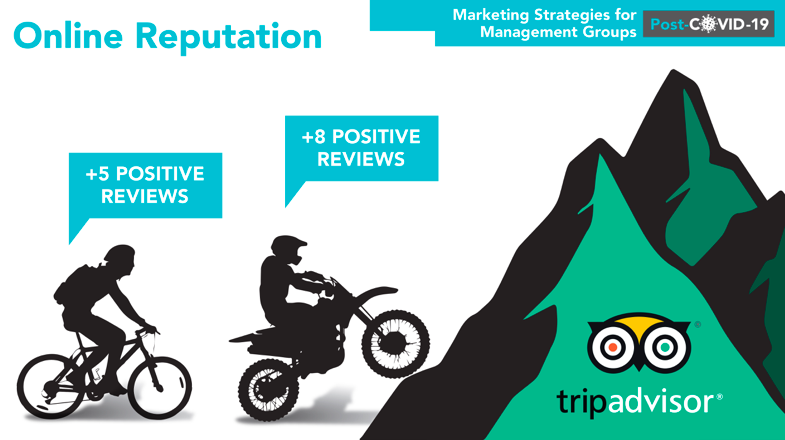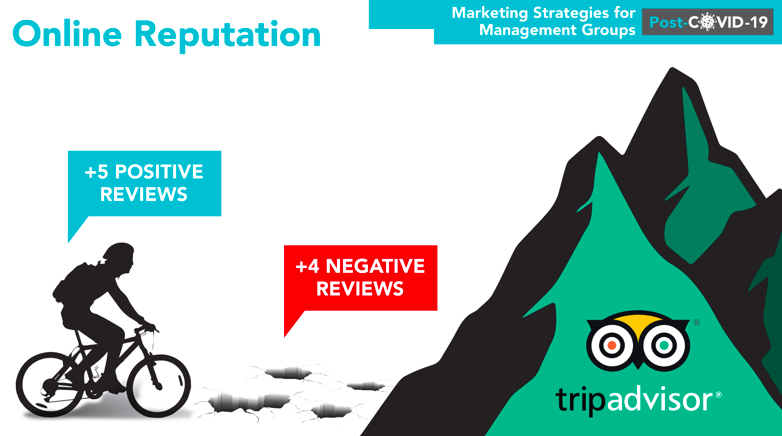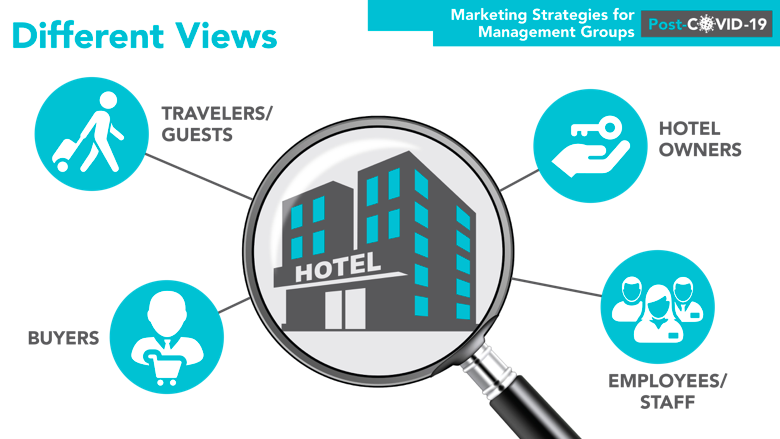Marketing Strategies for Management Groups Post COVID-19 [Webinar] Part 2: Online Reputation & Review Response

Online Reputation
Like social media, building an online reputation strategy for your group starts out by tracking and setting up alerts and notifications for each online review site. Quick response is key in resolving issues so it’s super important that your hotel’s staff is alerted as soon as feedback is left by the traveler. Next up, is focusing on the number of positive reviews per week of your properties. If your portfolio is the engine, positive reviews are the gas and will fuel your group’s goals towards max occupancy and ADR.
However, we know that online reputation is not a one-car race which leads us to our next step: analyzing your review performance in relation to your local competition. In 2020, with COVID-19 still on the minds of travelers, it’s not enough to focus your attention solely on your reviews. It’s vital to have a pulse on your local competition. That’s why at Travel Media Group we launched a brand new reputation metric called 1st Impression Score™, built for today’s hotelier looking at how travelers make booking decisions in real-time and how competitive their hotel is compared to others. So let’s take a look at why it’s important for management groups to be vigilant of a competitor’s online reputation in relation to their own.

When talking about online reputation for the hotel industry, the ultimate goal for any property is to reach the pinnacle of your market’s TripAdvisor ranking. Hotels are jockeying to hopefully secure that number one spot. So what is the strategy for powering your hotel towards the top of this mountain? Positive reviews are a great way to drive your property uphill in an attempt to climb the rankings. For this example, let’s say a hotel receives an average of five 5-star reviews per month. Last year they only averaged only three 5-star reviews per month, so they are expecting a big jump in their TripAdvisor ranking because of their hotel’s improvement in the number of positive reviews year over year. But when they check their ranking on TripAdvisor they see no change. In fact, a local competitor has even jumped over them in the rankings. So how does this happen?
While the hotel was focusing on improving their personal reputation performance they were failing to see how their competitors were performing. In fact, the competitor that jumped them in ranking was averaging eight 5-star reviews per month. So like the photo above illustrates, the first hotel is using a bike to climb the mountain, although it’s an improvement from what they were using a year ago is still no competition to the dirt bike, which is the other hotels continually outperforming them on the reputation front month over month. But what if the positive reviews are even and both hotels are using “bikes” to make the climb?

Well, the same principle can be applied to negative reviews which are considered potholes on your hotel’s uphill journey. According to TripAdvisor, in order to cancel out just one 1-star review, you would need to generate four 5-star reviews. So these negative reviews can significantly slow you down on your climb up the TripAdvisor rankings. This means if both you and your local competitors are generating the same number of positive reviews, it will be the hotel that best manages their negative reviews that will win the race to the top. So it is extremely important to manage not only the reputation of the properties in your portfolio, but also the hotels that they are competing against. If you have multiple hotels in the same market, you will not achieve market dominance without doing so.
Review Response
The final piece of a hotel group’s digital marketing is Review Response. A factor that, over the past decade, has become a bigger and bigger part of the traveler’s journey and decision-making process. With concerns over COVID-19, review response is being used as a tool to reassure guests and give them peace of mind about travel right now.
The question is: what steps can you take to be on top of your review response?
- First, gain access and logins for all online review sites. If possible, use a platform like Travel Media Group’s OneView®, where you have a single login and feed where you can respond to reviews from every site in one consolidated place. This will save your group a lot of time, especially when responding for an entire portfolio of properties.
- Next is to set standards and KPIs for your group hotels on review response rate and review response time. Travel Media Group has a multi-property report that helps hold individual hotels accountable by review site based on review response rate percentage.
- Lastly, look through sentiment analysis. It’s not enough now to just respond to reviews, we need to interpret the review data and feedback that we are receiving for our group of hotels so that we can make smart operational and capital decisions backed by review sentiment data.
Now let’s explore how review response impacts a guest’s impression of your hotel or group of hotels.

To illustrate the importance of review response I want you to imagine a couple checking out from a two-night stay, when they approach a front desk agent. While waiting for the invoice to print, the agent asks, “How was your stay?” The couple responds with a lengthy story about how they were blown away with the hotel’s service, impressed at it’s cleanliness, and could not ask for a better night’s stay. As the invoice prints, the agent hands it to the couple and says nothing. No thank you, no offer of appreciation, no well wishes. Complete silence. The couple eventually walks away confused and puzzled by interaction. Several minutes later, another couple enters the lobby, walks to the front desk, and again the agent asks, “How was your stay?” The other couple replies: it was horrible, the carpet was dirty, the room was noisy, and the beds were too hard. Worst hotel ever. Again the agent stays silent. No apology, no attempt to make it right, nothing. After a few seconds, the couple grows even more frustrated and leaves the hotel letting everyone in the lobby know that they are unhappy.
This is what happens when hoteliers do not respond to online reviews.
We don’t stay silent when we ask our guests how their stay was at the front desk one-on-one. So why would we stay silent online when all travelers are listening and looking? You can multiply this scenario by the number of properties in your portfolio, and then again by the number of unresponded reviews, and finally by the number of travelers reading those reviews. They’re seeing that there has been no acknowledgement or response from the property, which hurts your reputation – especially during COVID-19 times where consumers are being extremely cautious. So as you can see, review response is incredibly important right now and needs to be prioritized by your management group or group of hotels.

So how do we tie all this together for a management group or group of hotels? What long-term effect does a consistent social media strategy, a highly rated online reputation, and an accurate and timely review response plan have on a portfolio of properties? We’ve seen a lot of examples and illustrations today of how these digital marketing factors are important through the lens of a traveler or guest but what other views are we as a management group concerned with? If you are a managing partner, what about hotel owners? Owners are checking if your management group knows how to properly run and manage a hotel. Part of that is having a social strategy in place and a reputation management system that is both generating positive reviews and responding to them. How about buyers? We know that hotel assets trade hands all the time – groups both acquiring and selling properties. A part of their discovery/audit process includes researching the property online, especially today in 2020. It’s easier to sell a property with a 4.5-star reputation than a 2 star, and a better reputation typically translates to higher revenue and in turn could mean a better return for the seller. Lastly, what about future staff and employees? We know that one of the common factors to a hotel’s success rests on the quality of employees and staff. Applicants are doing research on the hotel that they are applying to. If they see constant complaints on reviews sites and unmanaged social pages they are going to be hesitant to accept a position with your group. Higher quality of digital presence translates to a higher quality of employee.
At Travel Media Group we understand these different lenses, the needs of hotel management groups, and the challenges they are facing especially now during the COVID-19 pandemic. We are here to help and our multi-property solutions are tailor-made to streamline operations and optimize portfolio performance.





0 Comments